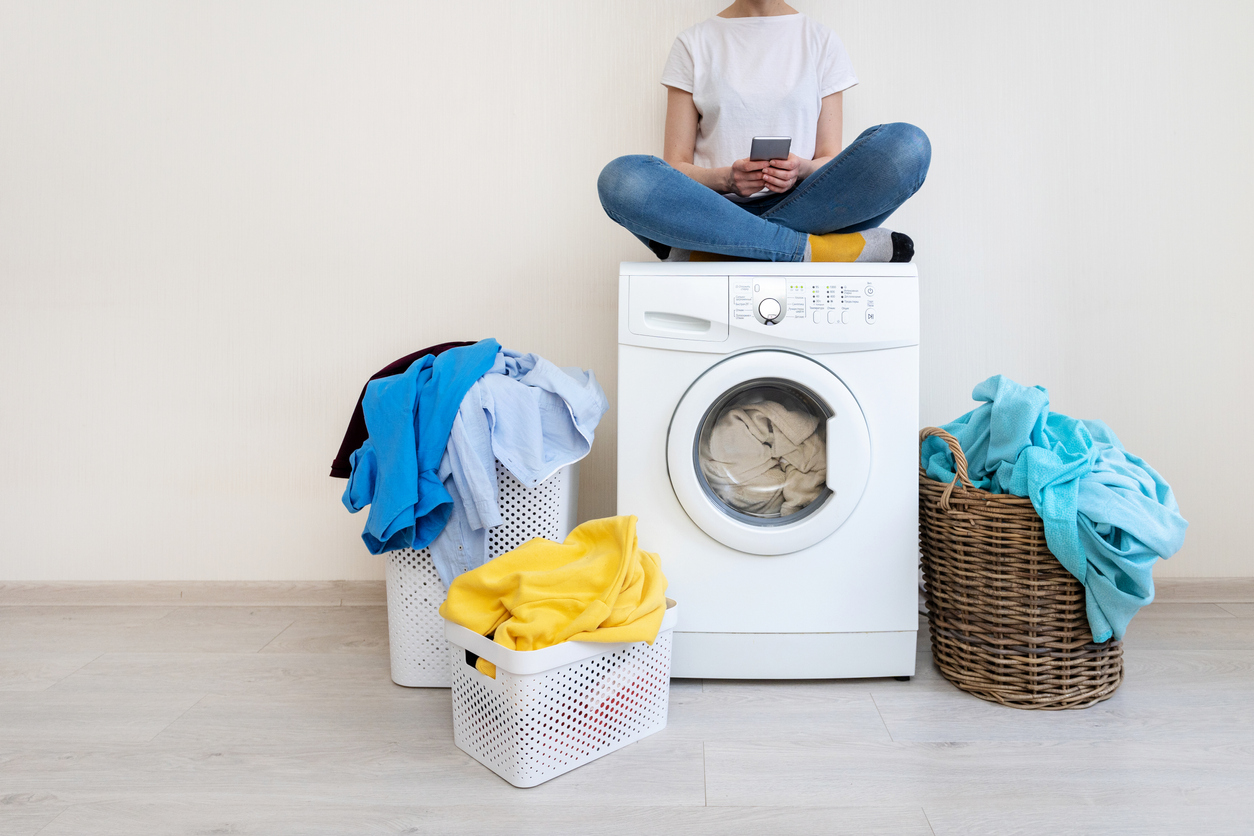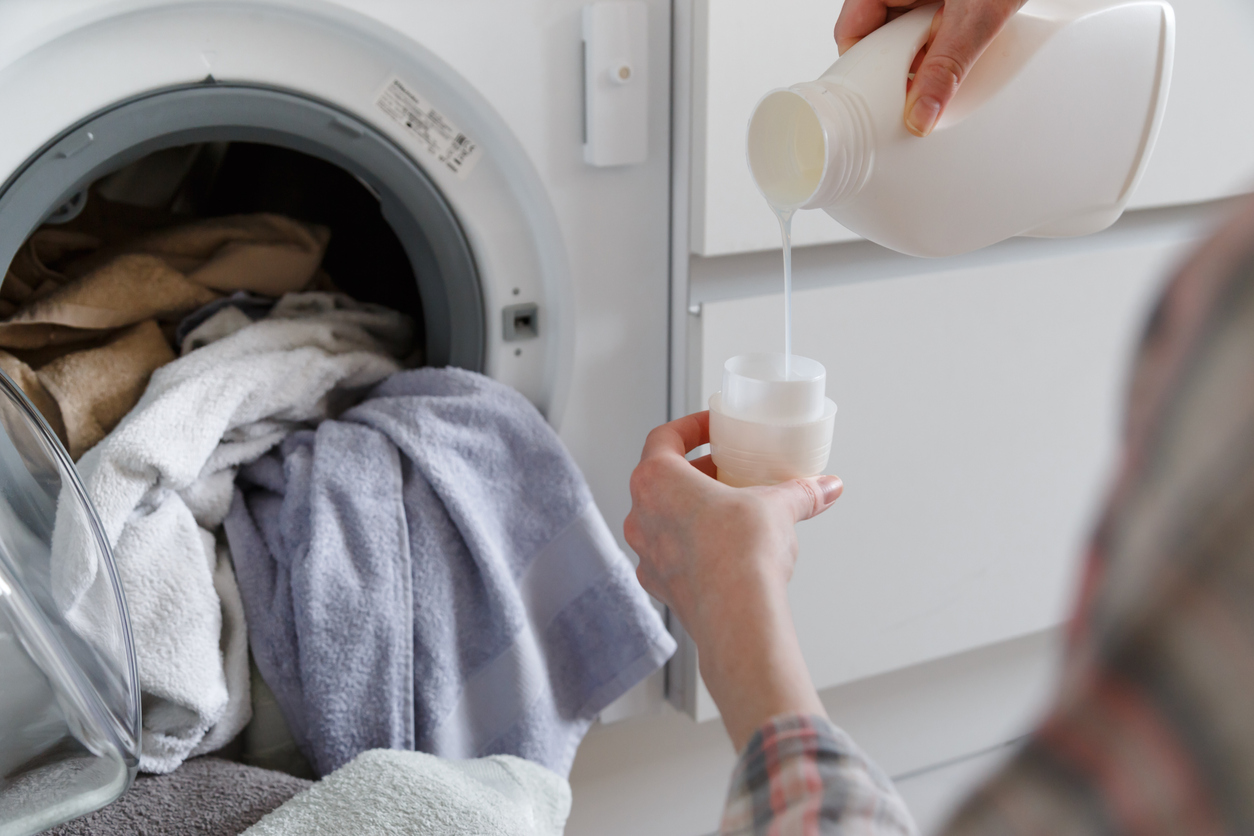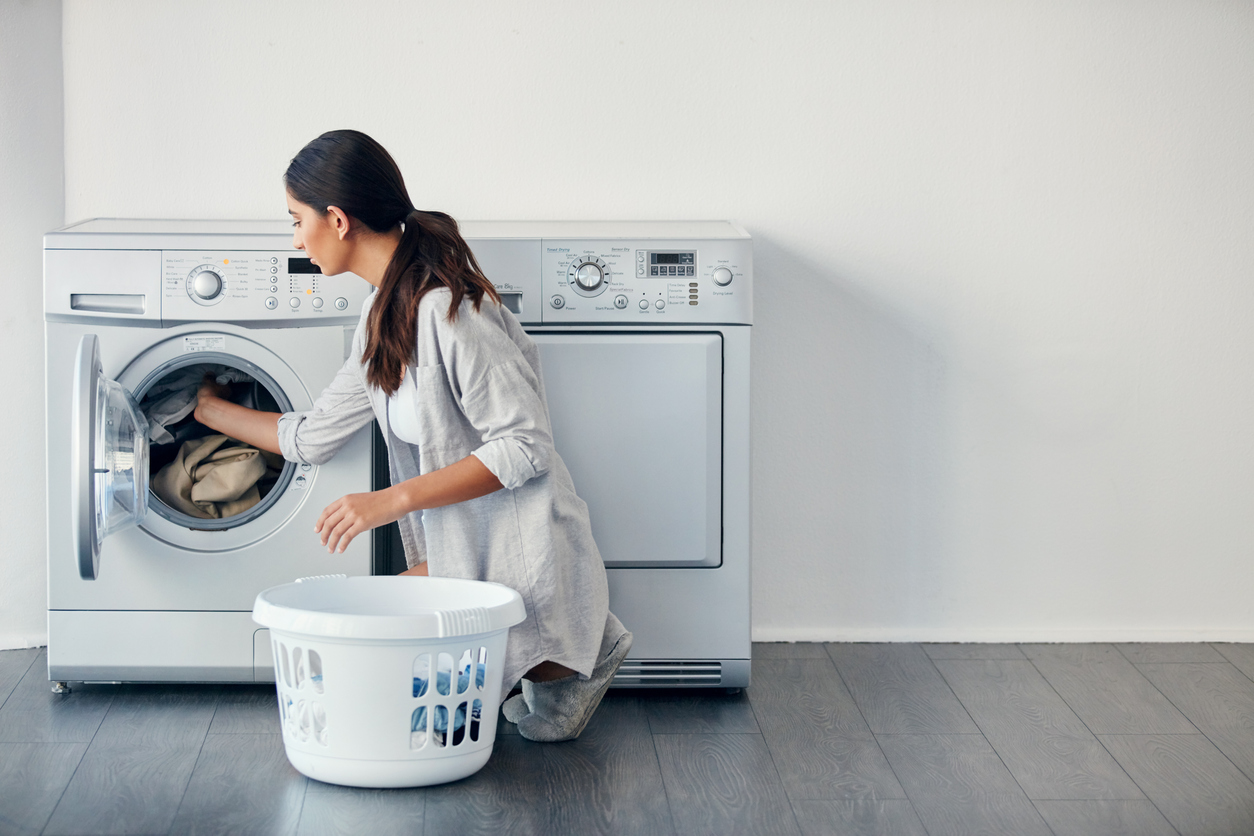At a Glance:
Pros & Cons of Front Load Washing Machines
Front-Load vs. Top Load Washers
Front-load washers are a growing commodity among American households. Between price points, technology, energy efficiency, and size, there are many different models and types of washing machines and you’ll need to choose wisely when picking which best fits you. We’re going to take a closer look at the pros and cons of front-load washers and how they best serve your home.
What to Consider Before Buying
Before we dive into everything there is to know about front-loading washers, let’s take a look at what questions to ask yourself before buying.

How much do you want to spend?
How much you’re willing to spend on a new washer will keep you from purchasing excess features that won’t serve you in the long run. Front-load washers can get pricey, so decide on your price limit from the beginning and stick to it. Once you have an idea of how much you want to spend on a washer, make sure not to look into ones with extravagant features or bigger sizes.
What size is best for your laundry room?
It’s important to take dimensions and measure correctly if you need to squeeze a front load washer into a smaller room. Take into account the swinging door of a front load washing machine and if you intend to stack your appliances or not. All these dimensions and sizes will impact your final purchase.
If you’re feeling lost, check out this video on how to measure correctly.
Is accessibility a problem?
Front-load washers will have you bending over every time you need to switch the laundry. If crouching and bending down is a problem for anyone in your family, we advise against front load washers. In contrast, a top load washer will have you reaching deep into the tub to pull out socks, so you will need to consider these factors.
A Complete Guide to Washing Machine Cycles & Settings
Pros & Cons of Front Load Washers
The time has come to dive into the pros and cons of front-load washers.
Better Cleaners
Studies consistently show that front load washing machines remove dirt and soils from linen and fabric more than top-load washers. Through rigorously testing front load washing machines, reputable sources like Consumer Reports and Reviewed.com gave excellent marks for wash performance on over 30 front load washer models.
Because of the motion in front load washers, this option cleans better and is more effective. Heat action (water temp), chemical reactions (detergents), and technological movements (the spin and motion of the washer itself) all encompass a front load washer’s ability to perform at a higher excellency than its counterpart. By having gravity on their side, front load washers tumble against detergents and one another to give you an efficient clean. Combining the perfect wash temperature (yes, that matters) and the right amount of detergent for each wash, you’ll find your clothing is getting cleaner faster while keeping your energy bill low.
If you’re one that tips the laundry basket straight into the drum (we’re guilty, too), unloads however much of a cheap detergent onto your clothes, and hits the ‘normal cycle’, you probably won’t be one to notice the significant wash difference these appliances give you. If you choose a suitable detergent, load in smaller cycles, and pick the correct cycle, you’ll see better washes in no time.
Discover The 8 Best LG Washers
Saves Energy
Depending on how often you use your washer and if you take advantage of different temperature cycles, your energy bill will vary from month to month. But based on the national average, Wirecutter estimates that buying a front-load washer instead of a top-load washer will provide you with enough energy to run a 50-inch LED TV consistently for five hours a day, for 81 days. Talk about energy-efficient!
But where front load washers pull their punches when it comes to saving energy is with water usage. Front-loaders consistently get the job done with less water usage than their competitors. Because of this, they don’t take as much water from your heater, which results in smaller water bills. On top of that, front loaders have faster cycles which in turn forces excess water out of fabrics before they hit the dryer. In both appliances, your laundry is spending less time washing and drying and more time being worn.
Water Savers
As we mentioned, the best front load washers use less water than top loaders. On average, front load washing machines use five fewer gallons of water every cycle than a typical top load washer. To break that down, even more, that means investing in a top load washing machine will give you about 2,000 more gallons of water per year, based on the average user. Because of gravity and how the drum is designed, front loaders don’t need to fill the entire tub with water to ensure that your clothing is fully submerged. By using rotation technology and other fabrics, front load washers will get the job done in less time with less water.

Stackable
And lastly, as we all know, you can easily stack your front load washer and dryer set. To give you more room to iron or fold laundry, these appliances save a lot of floor space. Whether you buy a washer and dryer or plan to stack your current appliances on top of one another, you’ll need to check if this is a compatible option. There can be a few downsides to stacking a front load washer and dryer, like higher controls or different repair times, but we’ll touch on that later.
Know-How to Stack Your Washer and Dyer
What to Watch Out For
So, if front load washers are so great, why do they get such a bad rap? We believe it’s due to old tales that front-loaders are less efficient and effective than top loaders. But, as we’ve proved, that is simply untrue. So why then are 76 percent of Americans still investing in top-load machines? It may have to do with American families loving large capacity washing machines, which front loaders don’t normally reach. But large capacity washers aren’t a bad thing. The average household in America washes over 400 loads of laundry per year!
We’ve come a long way since the early 1900s when laundry was done either by hand or in a barrel, but that doesn’t mean there are still kinks to work out with front loaders. Let’s take a look.
No Mid-Cycle Adds
Although you can add a forgotten shirt or a few socks mid-cycle, tossing in clothing while front loaders are running requires you to end the cycle and start from the top. If your clothes have been soaking for 15 minutes and you want your jeans to be fresh for the evening, you might as well forget about it. But most consumers are able to adjust to this minor inconvenience and know to look in all the crevices of their home before they press start.
Mold and Mildew
Yes, even the best front load washer has the chance to form pesky mildew issues. If you don’t use the right amount of water or the correct temperature or add too much detergent or fabric softener, you may find spores popping up on your washer. Another way mildew can become an issue is if you let the drum stay consistently wet between cycles. Between front load vs top load washers, top loaders won’t reek from funky smells as much. Because excess moisture can easily evaporate from an unsealed top door, this problem won’t occur nearly as often.
Although most technicians will say that they get called in to look at or fix odor and mildew spots more than any other issue with front loaders, it is preventable. To sustain your machine to be the best washer it can be, make sure to wipe down the gaskets and door after every cycle. On top of that, once a month, run a self-cleaning cycle with either chlorine bleach, white vinegar, or a specialty drum cleaner. These practices will keep your appliance the best front load washer it can be.

Bending Over to Load
Top loader washing machines are easier to load than front load machines. Due to the ability to easily reach into the drum, it’s better for some than bending down or crouching to pull out your laundry. If back pain is something you deal with, a front loader may not be the best option. Although, there is always the option to mount your laundry machine on a pedestal to decrease the crouch. But, a built-in pedestal for laundry machines does cost a hefty amount.
Don’t Overload
Laundry day is often long, and the rambling of a machine is something not everyone looks forward to hearing for hours on end. So, it can be tempting to stuff as much laundry into your machine as you can fit and be done with it. But overloading is what truly wears out your washing machine more than anything. Extra weight that comes from loading in your sweatshirts on top of an already-full machine will create rear-bearing issues. The bearings make the drum spin effectively.
This problem is easily preventable. By loading smaller amounts of laundry at a time, your machine will last longer, and you’ll see fewer repairmen come through your door.
Slow Wash Times
On average, a front load washer runs between 70 to 120 minutes per load, making them the slowest type of washer on the market. Compare that to top-load washers that clock in from 55 to 75 minutes per load, and you’ll find laundry day might be slow-moving. But what you lose in wash time, you may make up for in drying time. Because front-loaders are highly efficient in tumbling, there is less water that needs to evaporate while in the dryer. This means you can potentially save on money and time, which is what we’re all looking for.
Front Load vs Top Load Washers
We’ll do a quick analysis on front load vs top load washing machines.
|
Offered Features |
Front Load Washers |
Top Load Washers |
|
Fabric Care |
✓ |
|
|
Energy Efficiency |
✓ |
|
|
Water Efficiency |
✓ |
|
|
Easy Installation |
✓ |
✓ |
|
Longer Lifespan |
✓ |
|
|
Better Cleaning Performance |
✓ |
|
|
Ergonomics |
|
✓ |
|
Budget-Friendly |
|
✓ |
FAQs
Q: Do front loaders leak?
Front-load washers do not leak. This is a myth that originated when the first front load washing machines were introduced to the market. These early machines had occasional leakage caused by faulty rubber sealing at the doors. With a horizontal laundry drum, the rubber sealing is essential to prevent leaks. Today’s front load washers have addressed these early issues, and there is no leaking to be found.
Q: Do all front load washers have mold problems?
It’s been found that up to 17 percent of front load washing machines experience mold or mildew compared to top load washers, which rank at 3 percent. In front-load washers, the odor was reported in 15 percent of models, compared to top-loaders that came in at six percent.
Discover Today’s Best Front Load Washing Machine Brands
Why Trust East Coast Appliance?
Locally owned and operated since 1988, East Coast Appliance is the largest independent appliance dealer in Virginia. We sell it ALL — from new name-brand appliances to scratch-and-dent appliances to our very own refurbished appliances. Aside from our huge selection of every major brand and everyday low prices, what sets us apart from our competitors is that we service what we sell and that we are locally owned and operated with factory-trained associates. And if you’re a local, great news: East Coast Appliance is committed to providing the absolute lowest prices on the same available brand and model — simply bring in the ad of the local retail competitor while the lower price is in effect and you'll receive your price match.
Shop Front Load Washers with Us
There is a reason we are dubbed “The Discount King” — for unbeatable deals, shop front loaders online at East Coast Appliance. Our friendly associates are always happy to help you find the best front load washer and dryer set for you, whether you call us or use our online chat feature. Better yet, stop by one of our showrooms to see why we are the best appliance store in Virginia. Visit us today!
Learn More: GE Front Load Washers Reviewed


